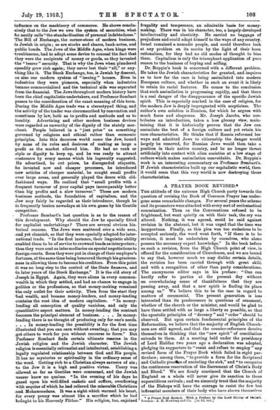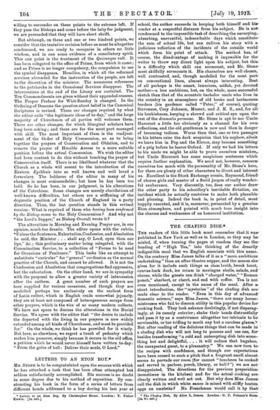A PRAYER BOOK REVISED.*
TILE attitude of the extreme High Church party towards the question of revising the Book of Common Prayer has under- gone some remarkable changes. For several years the scheme and its promoters were attacked with every sort of ecclesiastical commination. Then as the Convocations refused to be frightened, but went quietly on with their task, the cry was altered. Nothing, it was agreed, could be said against revision in the abstract, but it was urged that the time was inopportune. Finally, as this plea was too audacious to be accepted seriously, the word went forth, " If there is to be revision, it must be undertaken by ourselves, who alone possess the necessary expert knowledge." In the book before us such a revision, from the High Church point of view, is offered for the consideration of Churchmen, and we are bound to say that, however much we may dislike certain details, the revision has been carried through with great skill, and with a recognition of other than party considerations. The anonymous editor says in his preface : " One can hardly refer to parties at the present day without an overwhelming sense of thankfulness that they are passing away, and that a new spirit is finding its place among us." We believe this to be the case in regard to matters of ceremonial. The present generation is less interested than its predecessors in questions of ornament, whether of the church or the minister, and would be glad to have them settled with as large a liberty as possible, so that the apostolic principles of "decency " and " order " should be observed. But upon certain fundamental principles of the Reformation, we believe that the majority of English Church- men are still agreed, and that the counter-reformers deceive themselves in thinking that the "new spirit" of conciliation extends to them. At a meeting held under the presidency of Lord Halifax two years ago a declaration was adopted, pledging its supporters to " resist and refuse to employ " any revised form of the Prayer Book which failed in eight par- ticulars ; among them, " to provide a form for the Scriptural and Catholic practice of anointing the sick," and "to recognize the continuous reservation of the Sacrament of Christ's Body and Blood." We are firmly convinced that the Church of England as a whole will never give its sanction to these superstitions revivals ; and we sincerely trust that the majority of the Bishops will have the courage to resist the few but influential members of their body who have shown themselves
• 4 Prayer 130ale liecised. With a Preface by the Lord 13;shop c Oerord. London A. R. Mowbray and Co. [12. 61. net.]
willing to surrender on these points to the extreme left. If they pass the Bishops and come before the laity for judgment, we are persuaded that they will have short shrift.
But although, on these and one or two kindred points, we consider that the tentative revision before us must be altogether condemned, we are ready to recognize in others no little -wisdom, and in one some evidence of a conciliatory spirit. This one point is the treatment of the Quicunque salt. It has been relegated to the office of Prime, from which it came ; and as Prime is no longer compulsory, the compulsion to use the symbol disappears. Homilies, in which all the reformed services abounded for the instruction of the people, are left to the discretion of the minister. The numerous references to the patriarchs in the Occasional Services disappear. The intercessions at the end of the Litany are curtailed. The Ten Commandments are given without their appended reasons. The Proper Preface for Whit-Sunday is changed. In the Ordering of Deacons the question about belief in the Canonical Scriptures is revised. These are changes required by what the editor calls "the legitimate ideas of to-day," and the large majority of Churchmen of all parties will welcome them. There are other changes, for which liturgical scholars have long been asking ; and these are for the most part managed with skill. The most important of them is the readjust. ment of the Order of Holy Communion, so as to bring together the prayers of Consecration and Oblation, and to remove the prayer of Humble Access to a more suitable position before the actual Communion. We wish the editor had been content to do this without touching the prayer of Consecration itself. There is no likelihood whatever that the Church as a whole will assent to the introduction of the Eastern Epiklesis into so well _known and well loved a formulary. The boldness of the editor in many of his changes is most commendable; but here be has been too bold. So he has been, in our judgment, in his alterations of the 'Catechism. Some changes are merely elucidations of well-known difficulties, but others are a stiffening of the dogmatic position of the Church of England in a party direction. Thus, the last question stands in this revised version : What is required of them who haring been confirmed by the Bishop come to the Holy Communion ? And why not "the Lord's Supper," as Bishop Overall wrote it? - The alterations in Morning and Evening Prayer are, in our opinion, much too drastic. The editor opens with the rubric, "Unless the Sentences, Exhortation,Confession, and Absolution be said, the Minister . . . shall say, 0 Lord, open thou our lips," &c.; this preliminary matter being relegated, with the Commination Service, to a collection of "Forms to be used for Occasions of Penitence." This looks like an attempt to substitute "auricular" for "general" confession as the normal practice of the Church, and cannot be allowed. It is not the Confession and Absolution that congregations find oppressive, but the exhortation. On the other hand, we are in sympathy with the proposal to allow' a greater variety' of intercession after the anthem. A great number of each prayers are here supplied for various occasions, and though they are modelled perhaps too exclusively on the earliest form of Latin collect, which in English reads somewhat jejunely, they are at least not composed of heterogeneous scraps from other prayers, which is the vice of so many modern 'collects. We have not space to discuss the alterations in the Burial Service. We agree with the editor that "the desire to include the departed with the living in our prayers is now widely extended among all kinds of Churchmen, and must be provided for." On the whole, we think he has provided for it wisely. But here, as elsewhere, we regret a touch of pedantry which makes him preserve, simply because it occurs in the old office, a petition which he would never himself have written to-day : "From the gates of hell : Deliver their souls, 0 Lord."











































 Previous page
Previous page